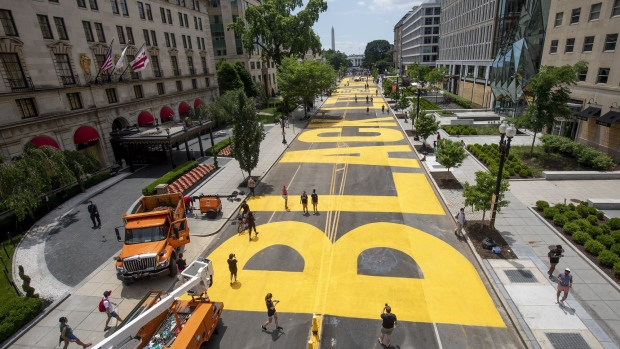Jun 24, 2020
‘Black Lives Matter’ Trademark Applications Surge After Protests
, Bloomberg News

(Bloomberg) -- As demonstrators gathered in cities across America to protest police brutality, some individuals were busy trying to trademark the slogans “Black Lives Matter” and “I Can’t Breathe” for use on merchandise, apparel and even wine.
Since May 25, when George Floyd was killed by a Minneapolis police officer, the U.S. Patent and Trademark Office has received 26 requests to trademark the slogans, according to a review by Bloomberg. The surge in applications -- just 19 such requests were filed from 2014 to 2017 -- is a testament to the burgeoning cultural power of Black Lives Matter.
Four of the proposals cited the desire to provide information or education services while the rest sought to link products -- from T-shirts and mugs to a Black Lives Matter Moscato wine -- to the civil-rights movement.
Applications to trademark the phrase in previous years were unsuccessful, and legal experts say the current attempts will likely fail, too. Meanwhile, at least one company is already rethinking its application for fear of alienating consumers who might recoil at the idea of trademarking protest slogans created to highlight the nation’s deep racial wounds.
‘Tone Deaf’
Breaking Games LLC filed an application in early June to trademark Black Lives Matter for a board game. The company’s parent, Ad Magic, is abandoning the trademark application, Chief Executive Officer Shari Spiro said in a statement because it was “tone deaf.”
“I was in the process of acquiring the unprotected TM for BLM in educational games to donate it in full to the organization that should rightfully own it,” Spiro said. “I sought no gain or publicity, nothing other than to make sure the unprotected IP went to the movement. Now I understand it was tone deaf to even try to make such a donation, and the TM abandonment should show in 4-5 days.”
A spokesperson for Ad Magic, which bills itself as a playing card publisher and advertising design firm, didn’t specify what the games were or which organization was to receive the donation.
Even if Breaking Games hadn’t pulled the application, it probably would have been rejected, said Liz Brodzinski, an intellectual property attorney at Banner Witcoff Ltd. in Chicago.
Trademarks serve to identify a group of goods or services to prevent confusion among consumers and clearly identify the origin of goods, Brodzinski said. And this isn’t the first time individuals have tried to trademark the phrases - the earliest attempts to trademark I Can’t Breathe and Black Lives Matter were in 2014 and 2015, respectively.
Applicants attempting to trademark the phrase today will likely be denied because of the age of the movement, Brodzinski said.
“The Trademark Office has been pretty consistent in refusing all Black Lives Matter applications,” she said. “If they were doing that years ago, now it’s much less likely that somebody could truthfully assert that they were the first and exclusive users of the mark.”
The Patent Office rejected the first Black Lives Matter trademark application in 2015 because it merely conveyed social or political messages and didn’t identify the source of the apparel to be sold or provide a way to distinguish it from other retailers. “The phrase is commonly used as an expression of support by many third parties and thus would not be viewed as an indicator of source in applicant alone,” patent officials wrote in a rejection letter.
Eric Garner
The first application to trademark I Can’t Breathe was filed after the death of Eric Garner, a 43-year-old Black man from Staten Island who was killed by police in 2014. Officers put Garner in a choke hold on the ground, and Garner said “I can’t breathe.”
Trademark officials rejected a 2014 application to trademark the words for merchandise and apparel because since Garner said the words, consumers could possibly “presume a connection between Eric Garner’s estate and the applicant’s goods, given the nation’s familiarity of the phrase he uttered before his death.”
That isn’t to say that a political slogan can’t be trademarked for use on apparel and other merchandise. The Trump campaign holds several trademarks for the Make America Great Again slogan because it comes from a specific source, the campaign, as opposed to Black Lives Matter, which is a broad based social-justice movement, Brodzinski said.
Stacey Stokes from Wilmington, Delaware, runs an online wine business called the Strange Fruit Collection and filed an application in June to trademark a #BlackLivesMatter Moscato and a #SayHerName Sweet Red, a reference to Black women who have been killed by police, according to her website.
Stokes got the idea in 2017 after seeing an ad for a White Girl Rosé on Instagram and wanted to create a wine for black women. But her idea, Black Girl Magic Moscato, had been trademarked under a similar name, she said. The name of her wine company, Strange Fruit, is a reference to the poem and Billie Holiday song about lynching.
“I like creative and innovative things and I wanted to make an impact in positive way,” said Stokes, a high school English teacher. “I haven’t seen any wine as a protest platform. Wine, food, art, landscaping, anything, can be used as a protest platform.”
The Patent Office has yet to approve her application, and Brodzinski said it will probably be rejected because it could potentially confuse consumers.
Still, Stokes said labels for her wines are being printed. She said some proceeds from the sale of her wine will be donated to groups that support anti-police brutality, prisons reform and “organizations that improve the Black community.”
“I’m just another piece of the puzzle and hopefully we’ll see some significant change,” Stokes said. There’s power in protest. Whatever you do, matters.”
©2020 Bloomberg L.P.